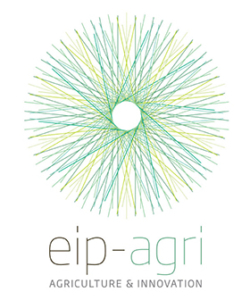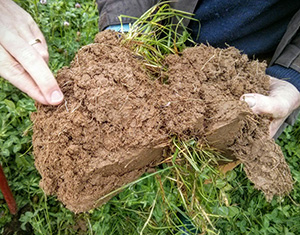
Acronym : EIPsoils
Code : 106324983
Contract Period : 20/05/2017 - 31/05/2021
Main Funder : European Innovation Partnership (EIP), RDPE scheme
ORC Staff Contact : Dominic Amos

This EIP operational group compares alternative soil assessment methods specifically for organic dairy systems (Albrecht method, Soil Respiration, etc.), working with the farmers David Wilson, Lyndon Edwards and Wil Armitage in 3-year field trials.
Organic and agro-ecological farming is fundamentally based on management of soil life and ecology to optimise forage and crop productivity. The processes of solubilisation of minerals, recycling of nutrients from manures, enhancing access to minerals through living systems and improved soil structure and N fixation by free living organisms are all dependant on a wide range of soil organisms, including fungi, bacteria and earthworms. This dependence on soil life distinguishes organic and agro-ecological farming from conventional, where plant nutrient supply is largely focused on provision of soluble nutrients in the form of fertilisers that can be readily absorbed by the plant.
Various new soil analysis techniques and associated soil recommendations are commercially available to organic and agro-ecological farmers as well as the standard pH, P, K, Mg analysis used by conventional farmers. None of these techniques have been systematically assessed for their suitability to provide sound recommendations for soil management and nutrient availability in organic and agro-ecological farming.
Recently, organic farmers have been advised to use Standard Analysis techniques and to aim for a target Index of 1 point lower than recommended for conventional farming. This target is based on anecdotal experience and knowledge of crop offtakes, but has never been validated leaving the farmers uncertain as to what levels to aim for.
Several organic and agro-ecological farmers have, in the last 3 or 4 years been introduced to the potential for Albrecht (Base Cation Exchange) Analysis. Others have tried to assess soil biological activity using soil respiration analysis. The validity of both these techniques have been questioned by soil specialists in the UK but they have been more widely used by organic and agro-ecological farms in the USA and elsewhere and significant claims are made in terms of soil health and fertility and forage and crop production, in turn linked to animal health.
This project will address this major deficiency in our understanding by:
The aim is to enhance productivity and sustainability of organic and agro-ecological farming by improving soil management. The project will assess the potential for deriving targeted recommendations for soil management in organic and agro-ecological farming through the commercial use of alternative soil analysis techniques. It will achieve this by comparing Albrecht (Base Cation Saturation Ratio) analysis and Soil Respiration analysis with Standard (pH, P, K, Mg, organic matter) analysis. It will draw on research and assess recently proposed optimum soil indices for organic farming. The farmer led project will involve farmers, advisers, researchers and analysis service providers who will bring experience in these techniques.
Project management
Also involved are OMSCO and Ian Robertson from The Glenside Group for soil analysis expertise.
Through partnership with farmer and adviser groups this project will effectively disseminate the results to farmers and advisers through a range of mechanisms including conferences, workshops, web material and technical leaflets.